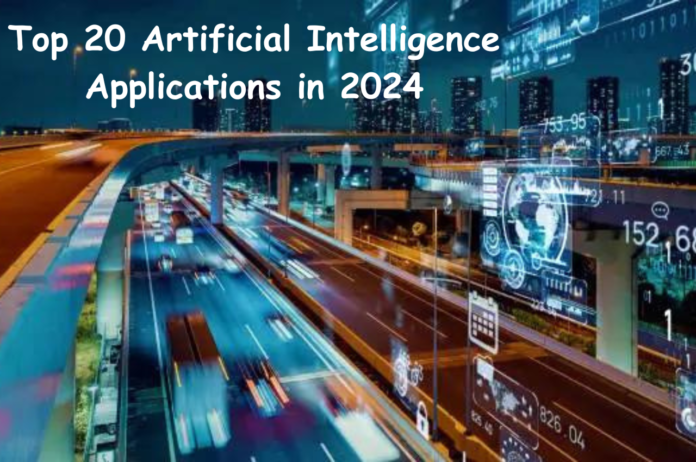Dear tech lovers, the effectiveness and popularity of artificial intelligence applications are increasing day by day. Artificial intelligence refers to the ability of a system or program to think and learn from experience. AI applications have developed tremendously in recent times resulting in their applications in every business industry. This article will help you learn about top 20 artificial intelligence applications in the real world.
Thank you for reading this post, don't forget to subscribe!What is Artificial Intelligence?
Artificial intelligence (AI) is the practice of converting machine-inferred intelligence into actions (physical and non-physical) that mimic human behavior or thinking. They are designed in such a way that they can be trained to solve any specific problem and make decisions based on given inputs. Artificial intelligence models are popular around the world today because their models are trained using huge amounts of data and have the ability to make intelligent decisions.
Why Artificial Intelligence is Required Today?
In recent times, artificial intelligence has the power to change our way of life in many areas and can have a positive impact on our lives. Here are some living examples which are already adopted by people today-
- NLP
- Predictions
- Personalization
- Analysis & Visualization
- Advanced Healthcare
Today we are surrounded by artificial intelligence applications and soon it is going to be everywhere around us. From forecasting critical weather information, providing advanced voice assistance, tailored graphs and charts to personalized recommendations and more. Now, let’s check out the top 20 artificial intelligence applications in 2024.
Top 20 Artificial Intelligence Applications in 2024
Artificial Intelligence (AI) is being applied across various industries and sectors, revolutionizing how tasks are performed, decisions are made, and problems are solved. Here is the list of the Top 20 Artificial Intelligence Applications in 2024:
- AI in Robotics
- AI in GPS and Navigation
- AI Applications in Education
- AI Applications in Agriculture
- AI in Marketing
- AI in Chatbots
- AI Applications in Military
- Artificial Intelligence Applications in E-Commerce
- Artificial Intelligence Applications in Lifestyle
- AI Applications in Healthcare
- AI Applications in Automotive Industry
- AI Applications in Automobiles
- Artificial Intelligence in Social Media
- Artificial Intelligence Applications in Gaming
- Artificial Intelligence Applications in Human Resource
- Artificial Intelligence Applications in Entertainment
- AI Applications in Banking and Finance
- Artificial Intelligence Applications in Astronomy
- Artificial Intelligence Applications in Data Security
- Artificial Intelligence Applications in Travel and Transport
1. AI in Robotics
AI in robotics refers to the integration of artificial intelligence (AI) techniques and algorithms into robotic systems to enable them to perceive, learn, reason, and act autonomously or semi-autonomously. It helps robots perceive and understand their environment through sensors such as cameras, lidar, radar, and sonar. Machine learning algorithms, including convolutional neural networks (CNNs) and recurrent neural networks
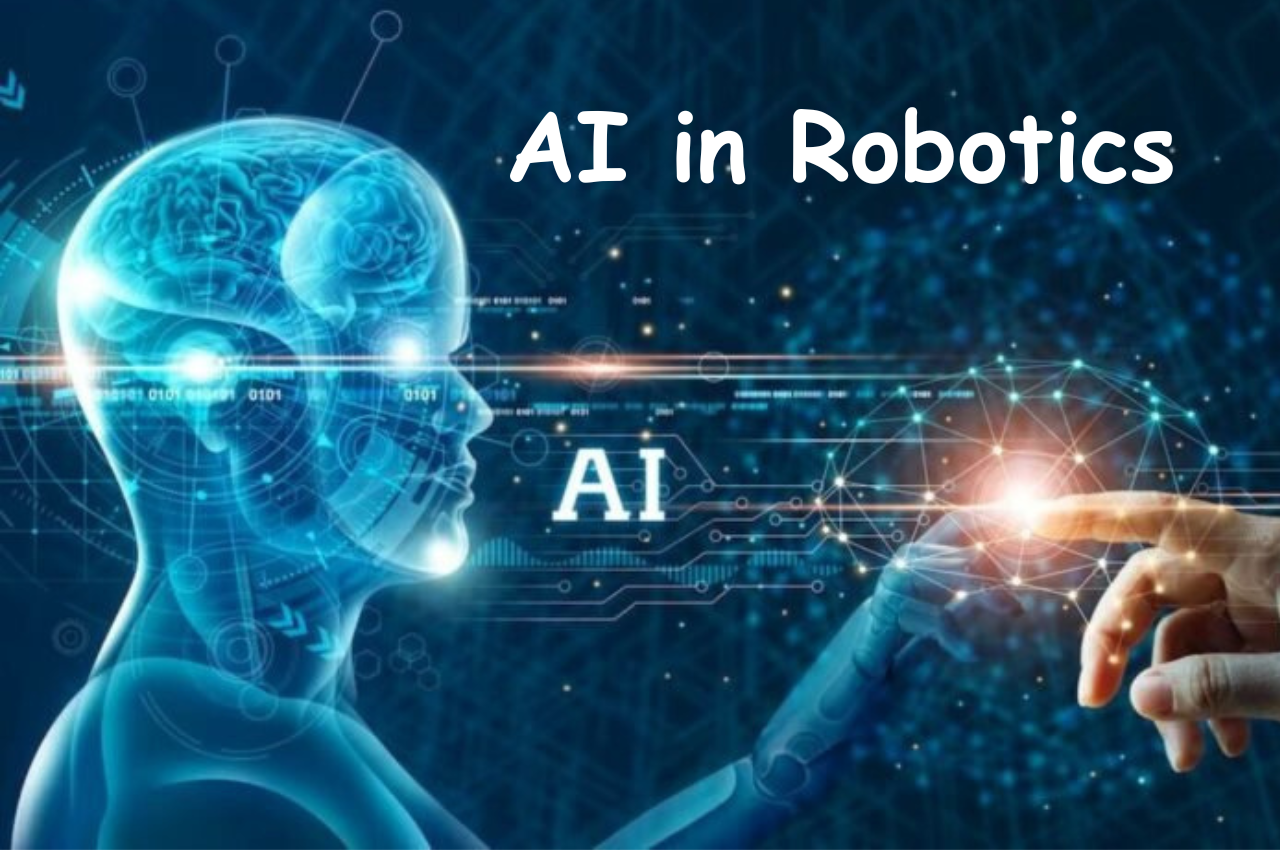 (RNNs), are often used to process sensor data and extract meaningful information about the surroundings. Robots can learn from their experiences and improve their performance over time using AI techniques such as reinforcement learning, imitation learning, and unsupervised learning. Reinforcement learning, in particular, enables robots to learn optimal actions by interacting with the environment and receiving feedback in the form of rewards or penalties. Here are several ways AI is utilized in robotics:
(RNNs), are often used to process sensor data and extract meaningful information about the surroundings. Robots can learn from their experiences and improve their performance over time using AI techniques such as reinforcement learning, imitation learning, and unsupervised learning. Reinforcement learning, in particular, enables robots to learn optimal actions by interacting with the environment and receiving feedback in the form of rewards or penalties. Here are several ways AI is utilized in robotics:
- Planning and Control: AI algorithms are employed to plan and execute complex actions and movements efficiently. Techniques such as path planning, motion planning, and trajectory optimization enable robots to navigate obstacles, manipulate objects, and perform tasks effectively.
- Localization and Mapping: AI assists robots in accurately determining their position and creating maps of their environment. Simultaneous Localization and Mapping (SLAM) algorithms leverage sensor data to estimate the robot’s pose relative to its surroundings and build a map of the environment in real-time.
- Natural Language Processing (NLP): NLP enables humans to interact with robots using natural language commands or queries. AI-powered NLP systems interpret human speech, understand intent, and generate appropriate responses, facilitating seamless human-robot communication and collaboration.
- Predictive Maintenance: AI algorithms can analyze sensor data from robotic systems to predict potential failures or maintenance needs. By detecting anomalies and patterns indicative of impending issues, AI-driven predictive maintenance techniques help prevent breakdowns and reduce downtime.
2. AI in GPS and Navigation
Artificial Intelligence (AI) plays a significant role in GPS (Global Positioning System) and navigation systems, enhancing their accuracy, efficiency, and functionality. AI algorithms can analyze real-time traffic data, historical patterns, and user preferences to optimize routes for efficiency and time savings. This helps in avoiding traffic congestion and finding the fastest routes to a destination. Here are several ways AI is integrated into GPS and navigation technology:
- Predictive Analysis: By analyzing historical data and real-time information, AI can predict traffic conditions, road closures, and other factors that may affect navigation. This enables GPS systems to provide users with proactive alerts and alternate routes to avoid potential delays.
- Map Updates and Corrections: AI-powered algorithms can automatically update maps by analyzing data from various sources, including satellite imagery, crowdsourced information, and user feedback. This ensures that navigation systems have the most accurate and up-to-date maps available.
- Machine Learning for Personalization: GPS and navigation apps often employ machine learning techniques to personalize the user experience. By analyzing user behavior and preferences, these systems can suggest destinations, routes, and points of interest that are relevant to individual users.
- Autonomous Navigation: AI plays a crucial role in autonomous navigation systems used in vehicles, drones, and other platforms. These systems use AI algorithms to perceive their environment, plan trajectories, and make real-time decisions to navigate safely and efficiently.
- Augmented Reality (AR): Some navigation apps incorporate AR technology to overlay navigation instructions and points of interest onto the real-world environment captured by the device’s camera. AI algorithms are used to precisely align virtual information with the user’s surroundings.
3. AI Applications in Education
Artificial Intelligence (AI) is revolutionizing education in various ways, offering solutions that enhance learning experiences, streamline administrative tasks, personalize education, and facilitate research. AI-powered systems can analyze students’ learning patterns, preferences, and strengths to tailor educational content accordingly. Adaptive learning platforms adjust the difficulty level of materials and provide targeted feedback to individual students, optimizing their learning paths. ITS utilizes AI techniques to emulate human tutoring, providing personalized guidance and feedback to students. These systems can offer assistance in various subjects, track progress, and adapt instructional strategies based on students’ performance. Here are some key AI applications in education:
- Automated Grading and Assessment: AI algorithms can automatically grade assignments, quizzes, and exams, saving teachers significant time and effort. Through natural language processing (NLP) and machine learning, AI systems can evaluate written responses and provide constructive feedback.
- Virtual Assistants and Chatbots: Educational institutions employ virtual assistants and chatbots powered by AI to support students and staff with queries related to course information, schedules, enrollment, and more. These AI-driven systems offer instant responses and guidance, enhancing overall efficiency.
- Data Analytics for Student Performance: AI enables educators to analyze vast amounts of data on student performance, attendance, and behavior to identify trends, predict outcomes, and intervene when necessary to support struggling students.
- Content Creation and Curation: AI technologies can generate educational content, such as quizzes, exercises, and tutorials, based on curriculum requirements and learning objectives. Additionally, AI algorithms assist in curating relevant educational resources from the vast amount of available online content.
- Language Learning and Translation: AI-powered language learning platforms leverage speech recognition, natural language understanding, and machine translation to facilitate language acquisition. These platforms offer interactive lessons, pronunciation feedback, and translation assistance.
- Research Assistance: AI supports academic research by automating literature reviews, citation management, and data analysis tasks. Natural language processing algorithms assist researchers in extracting insights from large volumes of scholarly articles and datasets.
4. AI Applications in Agriculture
AI applications in agriculture have been rapidly evolving, offering innovative solutions to various challenges faced by the industry. It enables farmers to optimize resource utilization by providing insights into soil health, moisture levels, and crop conditions.
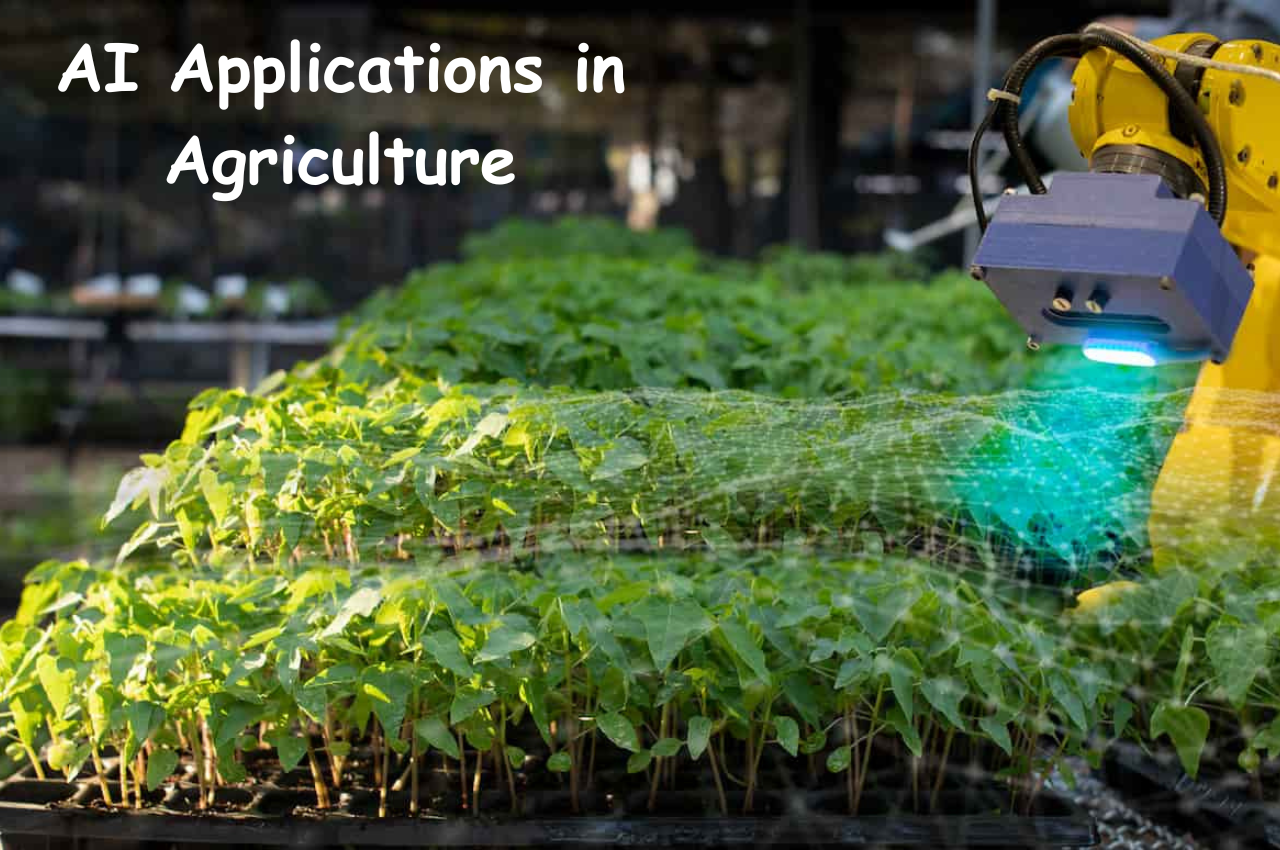 Drones equipped with AI-powered sensors can collect data such as crop health, pest infestations, and nutrient deficiencies, allowing farmers to make informed decisions about irrigation, fertilization, and pest control. AI algorithms analyze satellite imagery and data from sensors installed in fields to monitor crop growth patterns, detect diseases, and predict yields. This information helps farmers identify areas needing attention, such as areas with poor growth or signs of pests, allowing for targeted interventions. Some key applications include:
Drones equipped with AI-powered sensors can collect data such as crop health, pest infestations, and nutrient deficiencies, allowing farmers to make informed decisions about irrigation, fertilization, and pest control. AI algorithms analyze satellite imagery and data from sensors installed in fields to monitor crop growth patterns, detect diseases, and predict yields. This information helps farmers identify areas needing attention, such as areas with poor growth or signs of pests, allowing for targeted interventions. Some key applications include:
- Weed and Pest Detection: AI-powered image recognition systems can identify and classify weeds, pests, and diseases in crops using images captured by drones or smartphones. This allows for early detection and targeted application of herbicides or pesticides, reducing the need for blanket applications and minimizing environmental impact.
- Livestock Monitoring: AI-powered sensors and wearable devices can monitor the health and behavior of livestock, detecting signs of illness, distress, or estrus. This information helps farmers provide timely medical care, optimize feeding schedules, and improve breeding practices, leading to healthier animals and higher yields.
- Supply Chain Optimization: AI algorithms can analyze data from various sources such as weather forecasts, transportation schedules, and market demand to optimize the entire agricultural supply chain from production to distribution. This improves efficiency, reduces waste, and ensures fresher products reach consumers.
- Decision Support Systems: AI-based decision support systems provide farmers with real-time recommendations and insights tailored to their specific farm conditions and goals. These systems integrate data from multiple sources, such as sensors, weather forecasts, and market trends, to help farmers make informed decisions about planting, irrigation, fertilization, and pest control.
5. AI in Marketing
Artificial Intelligence (AI) has revolutionized the field of marketing in numerous ways, enabling marketers to make data-driven decisions, personalize customer experiences, optimize campaigns, and automate various processes. AI helps marketers analyze vast amounts of data quickly and efficiently, providing valuable insights into customer behavior, preferences, and trends. AI-powered analytics tools can identify patterns, segment audiences, and predict future outcomes with greater accuracy. AI enables marketers to deliver personalized experiences to individual customers at scale. By analyzing data from various sources, including past interactions, browsing history, and demographic information, AI algorithms can recommend products, tailor content, and customize marketing messages to match each customer’s preferences and interests. Here are some key areas where AI is transforming marketing:
- Content Creation and Optimization: AI technologies, such as natural language processing (NLP) and generative algorithms, can automate content creation tasks, including writing blog posts, product descriptions, and social media updates. AI-driven content optimization tools help marketers improve the relevance, quality, and performance of their content by analyzing audience engagement metrics and user feedback.
- Marketing Automation: AI streamlines marketing workflows and automates repetitive tasks, such as email marketing, lead nurturing, and campaign management. AI-powered marketing automation platforms can segment audiences, trigger personalized messages, and optimize campaign performance based on real-time data and insights.
- Ad Targeting and Optimization: AI algorithms enhance ad targeting by analyzing user behavior, demographics, and online activity to deliver relevant ads across various channels. Machine learning algorithms continuously optimize ad campaigns, adjusting bidding strategies, targeting parameters, and creative elements to maximize ROI and conversion rates.
6. AI in Chatbots
AI plays a central role in the development and functionality of chatbots. Chatbots are computer programs designed to simulate conversation with human users, typically through text or speech interfaces. AI techniques enable chatbots to understand and respond to user inquiries, engage in natural language processing (NLP), and sometimes even learn from interactions to improve their performance over time. Here’s how AI is utilized in chatbots:
- Natural Language Processing (NLP): NLP enables chatbots to understand and interpret human language inputs. Techniques such as named entity recognition, sentiment analysis, and part-of-speech tagging help chatbots extract meaning from user messages.
- Machine Learning: Machine learning algorithms empower chatbots to learn from data, adapt to new information, and improve their responses over time. Supervised learning can be used to train chatbots on labeled datasets of user interactions, while reinforcement learning enables chatbots to learn through trial and error by receiving feedback on their actions.
- Sentiment Analysis: Sentiment analysis algorithms enable chatbots to discern the emotional tone of user messages. By understanding user sentiment, chatbots can tailor their responses accordingly, providing empathetic and personalized interactions.
- Knowledge Representation and Reasoning: Chatbots often rely on knowledge bases or ontologies to store and retrieve information relevant to user queries. AI techniques help chatbots represent knowledge in a structured format and reason about complex queries to deliver accurate and informative responses.
7. AI Applications in Military
AI has been increasingly utilized in various military applications due to its potential to enhance decision-making, improve efficiency, and augment capabilities. It is used in the development of unmanned aerial vehicles (UAVs), unmanned ground vehicles (UGVs), and autonomous ships. These vehicles can perform reconnaissance, surveillance, and even combat missions without putting human lives at risk. AI algorithms analyze vast amounts of sensor data to predict when military equipment such as aircraft, vehicles, or weapons systems might fail. This enables proactive maintenance, reducing downtime and increasing operational readiness. Here are some key areas where AI is being applied in the military:
- Cyber Defense: AI is used to detect and respond to cyber threats in real-time, helping to protect military networks, systems, and data from hackers, malware, and other cyberattacks.
- Intelligence Analysis: AI-powered algorithms can sift through enormous volumes of data from various sources, including satellite imagery, intercepted communications, and social media, to identify patterns, trends, and potential threats.
- Training and Simulation: AI-based simulations provide realistic training scenarios for military personnel, allowing them to practice decision-making and tactical maneuvers in a virtual environment before deploying in the field.
- Target Recognition and Identification: AI algorithms can analyze sensor data from drones, satellites, and other platforms to automatically detect, classify, and track potential targets, such as enemy vehicles or personnel.
8. Artificial Intelligence Applications in E-Commerce
Artificial intelligence (AI) has revolutionized the landscape of e-commerce by enabling businesses to enhance customer experiences, streamline operations, and drive sales.
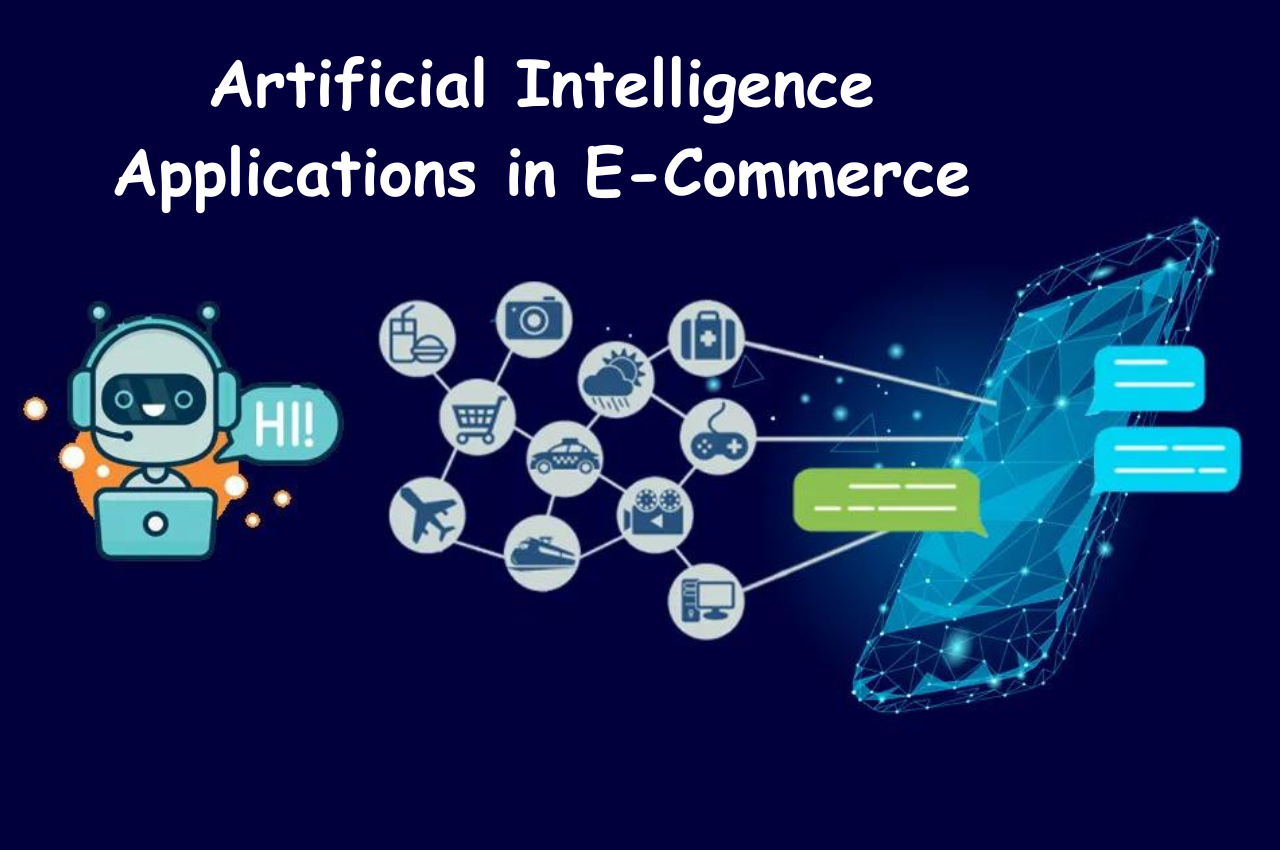 AI technologies generate personalized content, such as product descriptions, email campaigns, and website banners, tailored to individual customer preferences and demographics. By delivering relevant content, e-commerce businesses can engage customers more effectively and drive conversions. Here are several key applications of AI in e-commerce:
AI technologies generate personalized content, such as product descriptions, email campaigns, and website banners, tailored to individual customer preferences and demographics. By delivering relevant content, e-commerce businesses can engage customers more effectively and drive conversions. Here are several key applications of AI in e-commerce:
- Visual Search: AI enables visual search capabilities that allow users to search for products using images rather than text. By leveraging image recognition technology, e-commerce platforms can enhance the search experience, facilitate product discovery, and reduce friction in the purchasing process.
- Dynamic Pricing: AI algorithms dynamically adjust product prices in real-time based on factors such as demand, competitor pricing, inventory levels, and customer segmentation. Dynamic pricing strategies optimize revenue generation, maximize profits, and maintain competitiveness in the market.
- Voice Commerce: AI-driven voice assistants, like Amazon’s Alexa or Google Assistant, enable voice-activated shopping experiences. Customers can use voice commands to search for products, add items to their carts, and complete purchases, providing a convenient and hands-free shopping experience.
- Sentiment Analysis and Customer Insights: AI algorithms analyze customer reviews, social media mentions, and other forms of feedback to extract insights into customer sentiments, preferences, and satisfaction levels. These insights help e-commerce businesses understand their audience better and make data-driven decisions to improve products and services.
9. Artificial Intelligence Applications in Lifestyle
Artificial intelligence (AI) has numerous applications in lifestyle, enhancing various aspects of everyday living. Here are some ways AI is impacting lifestyle:
- Personalized Shopping: AI algorithms analyze consumer preferences and behavior to offer personalized recommendations, making shopping experiences more efficient and tailored. E-commerce platforms like Amazon and Netflix use AI to suggest products and content based on past purchases, viewing history, and demographic information.
- Smart Home Automation: AI-driven smart home devices, such as voice assistants (e.g., Amazon Alexa, Google Assistant) and smart thermostats (e.g., Nest), enable users to control various home functions using voice commands or automated routines. These devices learn user preferences and adjust settings accordingly to optimize comfort and energy efficiency.
- Virtual Assistants: AI-powered virtual assistants help users manage tasks, schedules, and reminders, acting as digital companions. They can schedule appointments, send messages, set alarms, and provide information in response to voice or text commands, streamlining daily activities and improving productivity.
10. AI Applications in Healthcare
Artificial intelligence (AI) is revolutionizing the healthcare industry in various ways, enhancing efficiency, accuracy, and patient outcomes. AI models can analyze patient data to predict the likelihood of diseases, readmissions, or complications. This enables healthcare providers to intervene proactively, personalize treatment plans, and manage resources more effectively. Some key applications of AI in healthcare include:
- Medical Imaging Analysis: AI algorithms can analyze medical images such as X-rays, MRIs, and CT scans to assist radiologists in detecting abnormalities like tumors, fractures, or lesions. This improves diagnostic accuracy and helps in early detection of diseases.
- Drug Discovery and Development: AI accelerates the drug discovery process by analyzing vast datasets to identify potential drug candidates, predict their efficacy, and optimize formulations. It also aids in virtual screening of compounds and identifying targets for drug intervention.
- Personalized Medicine: AI algorithms can analyze genetic, clinical, and lifestyle data to tailor treatment plans according to individual patient characteristics. This approach enables precision medicine, optimizing therapeutic outcomes while minimizing adverse effects.
- Robotics-Assisted Surgery: AI-powered robotic systems enhance surgical precision and dexterity, enabling minimally invasive procedures with improved outcomes and shorter recovery times. Surgeons can perform complex surgeries with greater accuracy and control.
- Clinical Trial Optimization: AI streamlines the clinical trial process by identifying suitable patient cohorts, predicting patient responses to treatments, and optimizing trial protocols. This reduces costs, accelerates drug development, and improves the likelihood of successful outcomes.
11. AI Applications in Automotive Industry
The automotive industry has been significantly transformed by the integration of AI technologies, revolutionizing various aspects of vehicle design, manufacturing, operation, and maintenance. Here are some key applications of AI in the automotive industry:
- Autonomous Vehicles: AI plays a central role in enabling self-driving or autonomous vehicles. Advanced AI algorithms process data from sensors such as LiDAR, radar, cameras, and GPS to perceive the environment, make decisions, and navigate safely without human intervention.
- Advanced Driver Assistance Systems (ADAS): AI-powered ADAS features enhance vehicle safety by providing assistance to drivers in various scenarios such as lane-keeping, adaptive cruise control, collision avoidance, automatic emergency braking, and parking assistance.
- Intelligent Manufacturing: AI is used in manufacturing processes for quality control, predictive maintenance of machinery, supply chain optimization, and autonomous robots for assembly tasks. AI-driven robotics and automation improve efficiency, flexibility, and precision in automotive manufacturing plants.
- Energy Efficiency and Emissions Reduction: AI optimization algorithms improve the energy efficiency of vehicles by optimizing engine performance, powertrain configurations, and hybrid/electric vehicle battery management systems. This helps in reducing fuel consumption and greenhouse gas emissions.
12. AI Applications in Automobiles
Artificial Intelligence (AI) has been increasingly integrated into various aspects of automobiles, revolutionizing the industry in numerous ways. AI plays a crucial role in enabling self-driving or autonomous vehicles. Advanced AI algorithms, including machine learning and deep learning, process data from various sensors such as cameras, LiDAR,
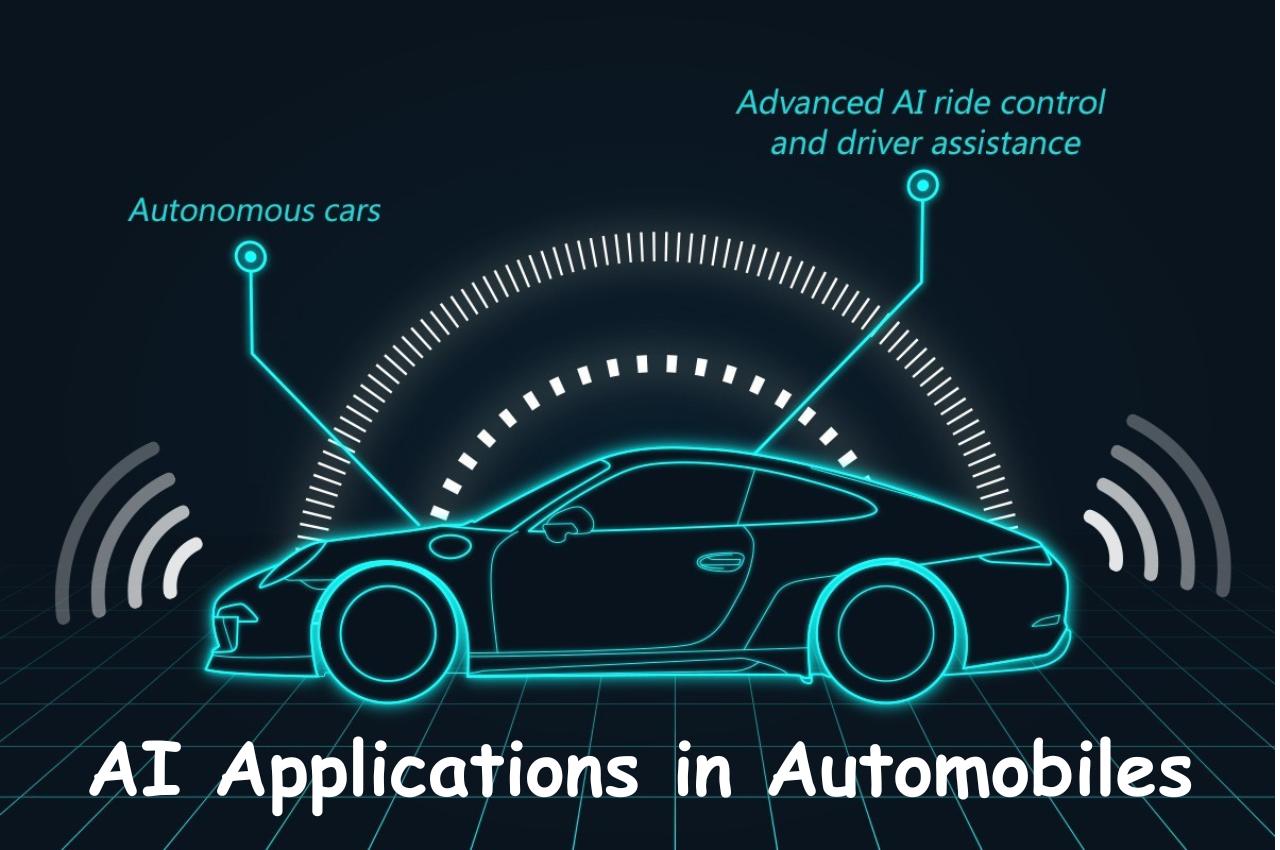 radar, and GPS to perceive the vehicle’s surroundings, make decisions, and navigate safely. Here are some key applications of AI in automobiles:
radar, and GPS to perceive the vehicle’s surroundings, make decisions, and navigate safely. Here are some key applications of AI in automobiles:
- Predictive Maintenance: AI algorithms analyze data from vehicle sensors and historical maintenance records to predict potential failures or malfunctions in various components. Predictive maintenance helps optimize vehicle uptime, reduce maintenance costs, and prevent unexpected breakdowns.
- Personalized In-Car Experience: AI algorithms analyze driver behavior, preferences, and contextual factors to personalize the in-car experience, such as adjusting seat positions, climate control settings, music playlists, and navigation routes based on individual preferences.
- Vehicle Diagnostics and Health Monitoring: AI-powered diagnostic systems continuously monitor vehicle performance and health by analyzing sensor data and detecting anomalies or potential issues in real-time. Early detection of problems allows for timely maintenance and reduces the risk of major failures.
13. Artificial Intelligence in Social Media
Artificial Intelligence (AI) plays a significant role in social media across various aspects, including content recommendation, user engagement, moderation, and advertising. Here’s a breakdown of how AI is utilized in social media:
- Content Recommendation: AI algorithms analyze user behavior, preferences, and interactions to recommend personalized content. Platforms like Facebook, Instagram, and Twitter use AI to suggest posts, videos, and ads tailored to individual users’ interests, increasing engagement and user satisfaction.
- User Engagement: Chatbots powered by AI are used for customer service, providing instant responses to user inquiries and resolving issues efficiently. These chatbots are integrated into messaging apps and social media platforms to interact with users, answer questions, and offer personalized recommendations.
- Content Moderation: AI algorithms are employed to detect and filter out inappropriate content, including hate speech, graphic imagery, and spam. Machine learning models can automatically flag and remove violating content, helping maintain a safe and respectful online environment. However, the effectiveness of content moderation AI has been debated due to challenges such as context understanding and the potential for bias.
14. Artificial Intelligence Applications in Gaming
Artificial intelligence (AI) has had a significant impact on the gaming industry, revolutionizing various aspects of game development, gameplay mechanics, and player experience. Here are some key applications of AI in gaming:
- Procedural Content Generation: AI algorithms are employed to generate game content such as levels, maps, terrain, and even entire worlds procedurally. This helps in creating vast, diverse, and unique game environments without the need for manual design.
- Adaptive Difficulty: AI systems can dynamically adjust the difficulty level of a game based on the player’s skill level, preferences, and performance. This ensures that players are consistently challenged without becoming frustrated or bored.
- Procedural Animation: AI algorithms are employed to generate lifelike animations for characters and creatures in games. This includes procedural animation systems that simulate realistic movement and behavior based on physics and biomechanics principles.
- Dynamic Game Balancing: AI can analyze player data in real-time to adjust various game parameters such as resource allocation, spawn rates, and rewards, ensuring a balanced and enjoyable experience for players of different skill levels.
15. Artificial Intelligence Applications in Human Resource
Artificial Intelligence (AI) has been increasingly utilized in various aspects of Human Resource (HR) management to streamline processes, improve decision-making, enhance employee experiences, and drive organizational effectiveness. Here are some key applications of AI in HR:
- Recruitment and Talent Acquisition: AI-powered applicant tracking systems (ATS) help HR professionals manage job postings, screen resumes, and identify suitable candidates based on predefined criteria. AI algorithms can analyze candidates’ resumes, cover letters, and online profiles to match them with job requirements, reducing time-to-hire and enhancing recruitment efficiency.
- Candidate Sourcing: AI-enabled tools can search and analyze vast pools of candidate data from various sources, including social media platforms, professional networks, and job boards, to identify potential candidates who match specific job requirements.
- Candidate Assessment: AI-powered assessment tools can evaluate candidates’ skills, cognitive abilities, personality traits, and cultural fit through online tests, video interviews, and gamified assessments. Natural Language Processing (NLP) algorithms can analyze candidate responses during interviews to assess communication skills, emotional intelligence, and language proficiency.
16. Artificial Intelligence Applications in Entertainment
Artificial intelligence (AI) has made significant inroads into the entertainment industry, revolutionizing various aspects of content creation, distribution, and consumption. Here are some key applications of AI in entertainment-
- Scriptwriting: AI can analyze vast amounts of data from existing scripts, genres, and audience preferences to generate new scripts or assist human writers in creating compelling stories.
- Visual Art: AI-powered tools can generate digital art, assist artists in creating visual effects, or even autonomously create entire scenes or landscapes.
- Editing and Visual Effects: AI tools can automate certain aspects of video editing, enhance visual effects, remove imperfections, or even generate entirely new visual elements.
- Targeted Advertising: AI algorithms analyze user data to deliver personalized advertisements and promotional content, maximizing engagement and conversion rates.
17. AI Applications in Banking and Finance
AI applications in banking and finance have seen significant growth and adoption in recent years due to their ability to streamline processes, improve decision-making, enhance customer experiences, and mitigate risks. It analyze market data, news, sentiment, and
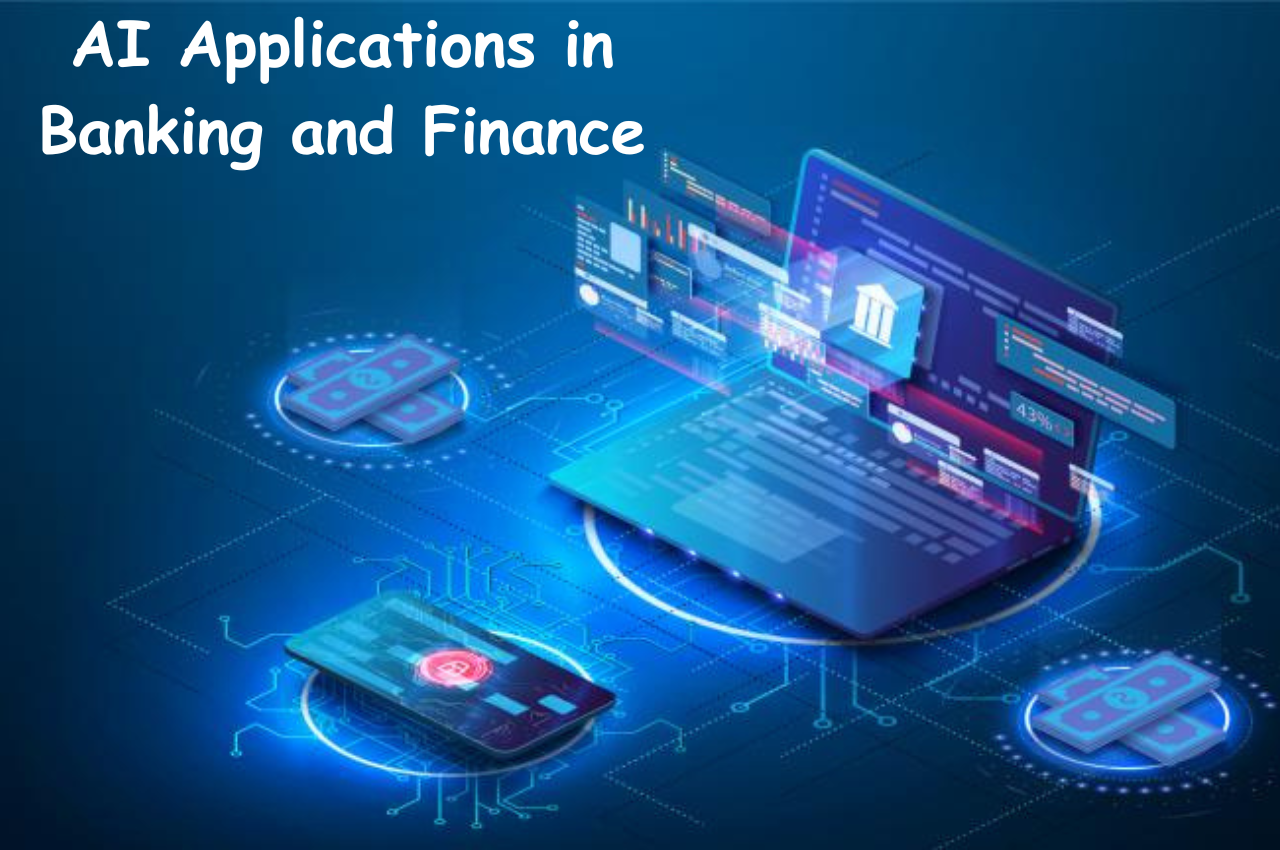 Other relevant factors to make rapid trading decisions on behalf of financial institutions. These algorithms can execute trades at high speeds and adjust strategies based on changing market conditions, leading to improved trading performance. Some key applications include:
Other relevant factors to make rapid trading decisions on behalf of financial institutions. These algorithms can execute trades at high speeds and adjust strategies based on changing market conditions, leading to improved trading performance. Some key applications include:
- Fraud Detection and Prevention: AI algorithms can analyze vast amounts of transaction data in real-time to identify suspicious patterns or anomalies that may indicate fraudulent activity. Machine learning models can continuously learn from new data to improve accuracy and stay ahead of evolving fraud tactics.
- Credit Scoring and Risk Assessment: AI-powered credit scoring models leverage various data sources, including traditional credit history, transactional data, social media behavior, and alternative data, to assess the creditworthiness of individuals and businesses more accurately. These models enable lenders to make more informed lending decisions and manage risks effectively.
- Customer Service and Personalization: AI-powered chatbots and virtual assistants provide personalized customer support, answer inquiries, and assist with account management tasks in real-time. Natural language processing (NLP) enables these systems to understand and respond to customer queries accurately, improving overall customer satisfaction.
- Regulatory Compliance and Risk Management: AI technologies assist banks and financial institutions in monitoring and complying with regulatory requirements by automating compliance processes, detecting compliance violations, and assessing operational risks. These systems help organizations mitigate regulatory risks and avoid costly penalties.
18. Artificial Intelligence Applications in Astronomy
Artificial intelligence (AI) has made significant contributions to various aspects of astronomy, revolutionizing how astronomers process data, analyze observations, and make new discoveries. AI tools help astronomers sift through large databases of astronomical observations to uncover hidden patterns, correlations, and new scientific insights. This facilitates the discovery of rare or unexpected phenomena and guides future observational campaigns. Here are several key applications of AI in astronomy:
- Object Detection and Classification: AI algorithms can automatically detect and classify celestial objects such as stars, galaxies, asteroids, and exoplanets in astronomical images. This helps astronomers to catalog and study these objects more efficiently.
- Astrophysical Simulations: AI techniques like deep learning are used to accelerate and optimize astrophysical simulations, which model complex phenomena such as galaxy formation, stellar evolution, and the dynamics of cosmic structures. AI-driven simulations enable astronomers to explore theoretical scenarios and test hypotheses more rapidly.
- Transient Event Detection: AI algorithms are deployed to identify transient events such as supernovae, gamma-ray bursts, and gravitational wave events in real-time data streams. Rapid detection of these events enables follow-up observations and studies across multiple wavelengths.
19. Artificial Intelligence Applications in Data Security
Artificial Intelligence (AI) plays a significant role in enhancing data security across various domains. AI-powered anomaly detection systems can identify unusual patterns or behaviors within data that may indicate potential security breaches. By analyzing large volumes of data in real-time, AI algorithms can quickly detect deviations from normal behavior and raise alerts for further investigation. Here are several key applications of AI in data security:
- Threat Intelligence and Monitoring: AI can continuously monitor networks, endpoints, and other IT infrastructure components to identify potential security threats. By leveraging machine learning algorithms, AI systems can analyze vast amounts of data from various sources to identify emerging threats and vulnerabilities, enabling organizations to take proactive measures to mitigate risks.
- Predictive Analytics: AI can analyze historical data to predict potential security threats and vulnerabilities. By leveraging machine learning models, AI systems can identify patterns and trends indicative of future security incidents, allowing organizations to implement preventive measures before an attack occurs.
- Privacy-Preserving Technologies: AI can also be used to develop privacy-preserving technologies that protect sensitive data while still allowing for meaningful analysis and insights. Techniques such as federated learning, differential privacy, and homomorphic encryption enable organizations to leverage AI for data analysis without compromising data security and privacy.
20. Artificial Intelligence Applications in Travel and Transport
Artificial Intelligence (AI) has been increasingly integrated into various aspects of the travel and transport industry, revolutionizing operations, enhancing customer experiences, and improving efficiency. AI-powered chatbots and virtual assistants provide instant customer support, handle bookings, provide travel information, and assist with itinerary planning.
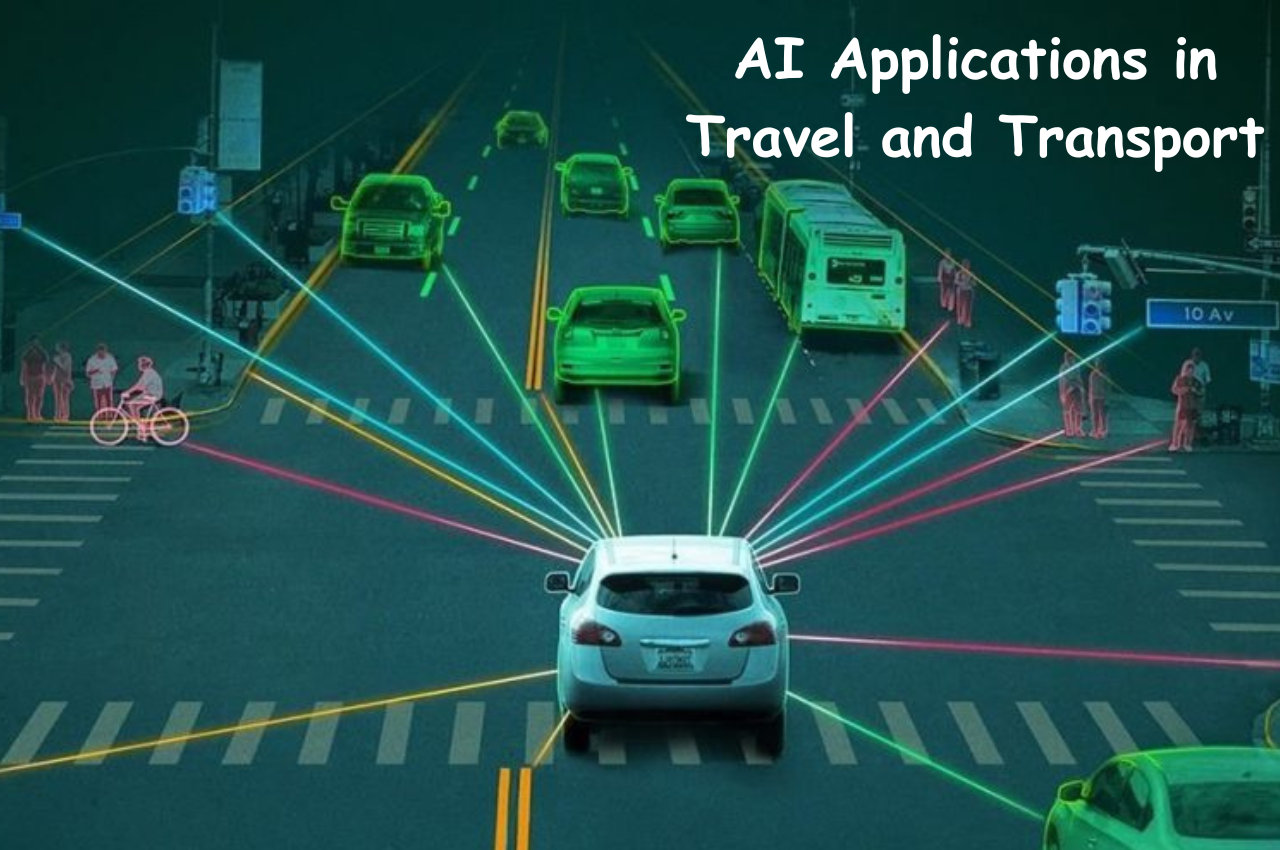 They are available 24/7, reducing the need for human intervention and improving customer service efficiency. Here are several key applications of AI in travel and transport:
They are available 24/7, reducing the need for human intervention and improving customer service efficiency. Here are several key applications of AI in travel and transport:
- Predictive Maintenance: In the transport sector, AI is used for predictive maintenance of vehicles, aircraft, and infrastructure. By analyzing sensor data, AI algorithms can detect potential equipment failures before they occur, allowing for proactive maintenance and minimizing downtime.
- Route Optimization: AI algorithms optimize transportation routes for efficiency and cost-effectiveness. For example, in logistics and shipping, AI analyzes factors such as traffic patterns, fuel consumption, delivery schedules, and vehicle capacities to determine the most efficient routes for transporting goods.
- Smart Traffic Management: AI is used to optimize traffic flow and reduce congestion in urban areas. AI-powered traffic management systems analyze real-time traffic data from sensors, cameras, and GPS devices to dynamically adjust traffic signals, reroute vehicles, and manage traffic flow.
What Are The Risks of Artificial Intelligence (AI)?
Applications and uses of artificial intelligence are everywhere today in real life fields from healthcare to security and even the military. But there is no denying that it comes with great responsibilities as there is scope for error which is definitely posing threat to human life as well. Many examples can be given where privacy violations have taken place.
More Info: Top 30 Machine Learning Applications in 2024
Do you remember? In 2017, a Hong Kong firm bought an AI system for trading automation that ended up losing them USD 20 million. By now you must have realized that trusting AI and the latest technology can be a huge risk for the entire human race.
Final Thoughts
Finally, the applications of Artificial Intelligence are vast and transformative, affecting your daily life in profound ways. From improving the shopping experience and educational outcomes to revolutionizing healthcare and robotics, AI has its uses. As technology continues to advance, innovations in Artificial Intelligence Applications promise a future where intelligent systems enrich our lives in ways unimaginable. From today’s talk at Technocommy, you must have realized how widespread artificial intelligence applications will be in 2024. So Technocommy will be your ultimate destination to get the latest technology news.


